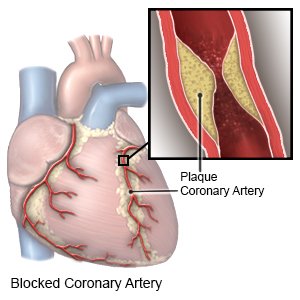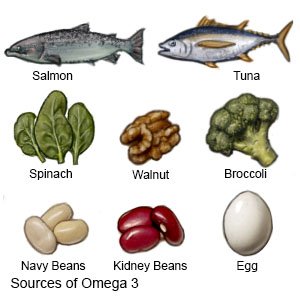Cholesterol and your Child's Health
Medically reviewed by Drugs.com. Last updated on Jun 5, 2024.
AMBULATORY CARE:
Cholesterol
is a waxy, fat-like substance. Your child's body uses cholesterol to make hormones and new cells, and to protect nerves. Cholesterol is made by your child's body. It also comes from certain foods, such as meat and dairy products. Your child's healthcare provider can help you set goals for your child's cholesterol levels. The provider can help you and your child create a plan to meet those goals.
Cholesterol level goals:
Your child's cholesterol level goals depend on his or her age. They also depend on your child's risk for heart disease, and other health conditions he or she has. The following are general guidelines:
- Total cholesterol includes low-density lipoprotein (LDL), high-density lipoprotein (HDL), and triglyceride levels. The total cholesterol level should be lower than 170 mg/dL.
- LDL cholesterol is called bad cholesterol because it forms plaque in your child's arteries. As plaque builds up, your child's arteries become narrow, and less blood flows through. This increases your child's risk for heart disease, a heart attack, or a stroke later in life. The level should be lower than 110 mg/dL.

- HDL cholesterol is called good cholesterol because it helps remove LDL cholesterol from your child's arteries. It does this by attaching to LDL cholesterol and carrying it to his or her liver. Your child's liver breaks down LDL cholesterol so his or her body can get rid of it. High levels of HDL cholesterol can help prevent a heart attack and stroke. Low levels of HDL cholesterol can increase your child's risk for heart disease, heart attack, and stroke later in life. The level should be higher than 45 mg/dL.
- Triglycerides are a type of fat that store energy from foods your child eats. High levels of triglycerides also cause plaque buildup. This can increase your child's risk for a heart attack or stroke later in life. If your child's triglyceride level is high, his or her LDL cholesterol level may also be high. The level for children 9 years or younger should be 75 mg/dL or lower. The level for children and adolescents 10 years or older should be 90 mg/dL or lower.
What increases your child's risk for high cholesterol:
- Having overweight or obesity, or not getting enough exercise
- A medical condition such as hypertension (high blood pressure) or diabetes
- A family history of high cholesterol
What you need to know about having your child's cholesterol checked:
Blood tests are used to check your child's cholesterol levels. Blood tests measure your child's levels of triglycerides, LDL cholesterol, and HDL cholesterol. Your child should have his or her cholesterol checked between 9 and 11 years of age. Your child should have it checked a second time between 17 and 21 years of age. Your child may need his or her cholesterol checked between 2 and 8 years of age if any of the following is true:
- Your child's parent or close relative has a total cholesterol level of 250 mg/dL or higher.
- Your child's parent was diagnosed with heart disease before 55 years of age.
- Your child has diabetes, high blood pressure, or smokes cigarettes.
- Your child has overweight or obesity.
- Your child has kidney disease, juvenile arthritis, or Kawasaki disease.
How healthy fats affect your child's cholesterol levels:
Healthy fats, also called unsaturated fats, help lower LDL cholesterol and triglyceride levels. Healthy fats include the following:
- Monounsaturated fats are found in foods such as olive oil, canola oil, avocado, nuts, and olives.
- Polyunsaturated fats, such as omega 3 fats, are found in fish, such as salmon, trout, and tuna. They can also be found in plant foods such as flaxseed, walnuts, and soybeans.
How unhealthy fats affect your child's cholesterol levels:
Unhealthy fats increase LDL cholesterol and triglyceride levels in your child's blood. They are found in foods high in cholesterol, saturated fat, and trans fat:
- Cholesterol is found in eggs, dairy, and meat.
- Saturated fat is found in butter, cheese, ice cream, whole milk, and coconut oil. Saturated fat is also found in meat, such as hamburgers, sausage, hot dogs, and bologna.
- Trans fat is found in liquid oils and is used in fried and baked foods. Foods that contain trans fats include chips, crackers, muffins, sweet rolls, microwave popcorn, and cookies.
Treatment
for high cholesterol will decrease your child's risk for health problems later in life. This includes heart disease, heart attack, and stroke.
- Lifestyle changes may include food, exercise, and weight loss. Your child's healthcare provider will want to start with lifestyle changes. Other treatment may be added if lifestyle changes are not enough.
- Medicines may be prescribed if lifestyle changes do not lower your child's cholesterol levels within 6 months. Medicine is usually only given to children 10 years or older who have high LDL cholesterol levels.
Food changes that can help lower your child's cholesterol levels:
A dietitian can help you create a heart healthy eating plan for your child. The dietitian can show you how to read food labels to choose foods low in saturated fat, trans fats, and cholesterol. Depending on your child's age, he or she may also be shown how to read food labels.
 |
- Give your child foods low in fat. Feed your child lean meats, fat-free or 1% fat milk, and low-fat dairy products, such as yogurt and cheese. Try to limit or avoid the amount of red meat you give your child. Limit or do not feed your child fried foods or baked goods, such as cookies.
- Replace unhealthy fats with healthy fats. Cook foods in olive oil or canola oil. Choose soft margarines that are low in saturated fat and trans fat. Seeds, nuts, and avocados are other examples of healthy fats.
- Feed your child foods with omega-3 fats. Examples include salmon, tuna, mackerel, walnuts, and flaxseed. Do not give your child fish that have high levels of mercury, such as shark, swordfish, and king mackerel.

- Increase the amount of high-fiber foods your child eats. High-fiber foods can help lower LDL cholesterol. Help your child get between 20 and 30 grams of fiber each day. Fruits and vegetables are high in fiber. Offer your child at least 5 servings each day. Other high-fiber foods are whole-grain or whole-wheat breads, pastas, or cereals, and brown rice. Give your child 3 ounces of whole-grain foods each day. Increase fiber slowly. Your child may have abdominal discomfort, bloating, and gas if you add fiber too quickly.

- Give your child healthy protein foods. Examples include low-fat dairy products, skinless chicken and turkey, fish, and nuts.
- Limit foods and drinks that are high in sugar. Your dietitian or healthcare provider can help you create daily limits for high-sugar foods and drinks. The limit may be lower if your child has diabetes or another health condition. Limits can also help your child lose weight if needed.
Help your child make lifestyle changes to lower his or her cholesterol levels:
- Help your child maintain a healthy weight. Ask your child's healthcare provider what a healthy weight is for your child. The provider can help you and your child create a weight loss plan if needed. Weight loss can decrease your child's total cholesterol level. Weight loss may also help keep your child's blood pressure at a healthy level.
- Encourage your child to exercise regularly. Exercise can help lower your child's cholesterol level and maintain a healthy weight. Exercise can also help increase your child's HDL (good) cholesterol level. Work with your child's healthcare provider to create an exercise program that is right for him or her. Your child should get 30 to 60 minutes of moderate exercise most days of the week. Examples of exercise include brisk walking, swimming, or biking. Your child may enjoy exercise more if the whole family is active together. Team sports may also help your child get enough exercise.

- Do not let your older child smoke. Nicotine and other chemicals in cigarettes and cigars can raise his or her cholesterol levels. Ask your child's healthcare provider for information if he or she currently smokes and needs help to quit. E-cigarettes or smokeless tobacco still contain nicotine. Talk to your child's healthcare provider before he or she uses these products.
© Copyright Merative 2024 Information is for End User's use only and may not be sold, redistributed or otherwise used for commercial purposes.
The above information is an educational aid only. It is not intended as medical advice for individual conditions or treatments. Talk to your doctor, nurse or pharmacist before following any medical regimen to see if it is safe and effective for you.
Further information
Always consult your healthcare provider to ensure the information displayed on this page applies to your personal circumstances.
